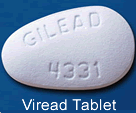Tenofovir
Remains Effective against Hepatitis B Virus after
5 Years in HIV/HBV Coinfected Patients
 |
 |
 |
 |
| SUMMARY:
Tenofovir (Viread,
also in the Truvada and Atripla combination
pills) continues to potently suppress both
hepatitis B virus (HBV) and HIV in coinfected
patients for at least 5 years, according
to a study published in the December
2010 issue of Gastroenterology.
The findings support current guidelines
recommending that HIV/HBV coinfected people
should receive an antiretroviral
therapy (ART) regimen that includes
drugs with dual action against both viruses. |
|
 |
 |
 |
 |
By
Liz Highleyman
 Due
to overlapping routes of transmission, many people
are infected with both HIV
and HBV. Although the viruses are not related,
some nucleoside/nucleotide analog drugs are active
against both, including tenofovir,
lamivudine
(3TC; Epivir), and emtricitabine
(FTC; Emtriva).
Due
to overlapping routes of transmission, many people
are infected with both HIV
and HBV. Although the viruses are not related,
some nucleoside/nucleotide analog drugs are active
against both, including tenofovir,
lamivudine
(3TC; Epivir), and emtricitabine
(FTC; Emtriva).
Theodora de Vries-Sluijs from Erasmus University Medical
Center in the Netherlands and colleagues investigated
the long-term efficacy and kidney safety of tenofovir
administered to HIV/HBV
coinfected patients as part of a complete ART
regimen.
This prospective cohort study included 102 coinfected
participants at 6 centers in the Netherlands who were
treated with tenofovir, either as their sole anti-HBV
drug or in combination with lamivudine or emtricitabine.
33 patients had taken lamivudine previously and developed
resistance mutations. At baseline 80% had detectable
HBV DNA viral load > 20 IU/mL. Participants were
followed for an average of 4.5 years.
Results
 |
Among
67 patients who had detectable HBV DNA at baseline
and were hepatitis B "e" antigen (HBeAg)
positive, 92% experienced virological response
(HBV DNA < 20 IU/mL) after 5 years of treatment.
|
 |
Response
rates did not differ significantly between patients
with or without lamivudine resistance at baseline.
|
 |
46%
of these patients experienced HBeAg loss and 12
achieved hepatitis B surface antigen (HBsAg) loss. |
 |
Among
15 baseline detectable HBeAg negative patients,
100% experienced virological response after 4
years of treatment. |
 |
2
of these individuals (13%) experienced HBsAg loss.
|
 |
20
participants (20%) -- all HBeAg negative -- had
undetectable HBV DNA at baseline. |
 |
During
a median follow-up period of 52 months, all but
1 (95%) inthis group maintained undetectable HBV
viral load. |
 |
2
of these patients (10%) experienced HBsAg loss. |
 |
HBV
viral decay occurred at similar rates in people
with and without lamivudine resistance mutations. |
 |
Overall,
1 patient developed a combination of drug resistance
mutations for anti-HBV drugs and experienced virological
breakthrough. |
 |
3
people (3%) discontinued tenofovir due to elevated
serum creatinine levels, an indicators of possible
kidney dysfunction. |
 |
The
estimated decrease in kidney function after 5
years on tenofovir was 9.8 mL/min/1.73 m2, and
was most pronounced shortly after starting the
drug. |
 |
3
patients -- all with cirrhosis at baseline --
developed hepatocellular carcinoma during follow-up. |
"[Tenofovir],
administered as part of antiretroviral therapy, is
a potent anti-HBV agent with a good resistance profile
throughout 5 years of therapy," the investigators
concluded. "Only small non-progressive decreases
in renal function were observed."
It is well know that anti-HIV drugs must be used in
combination regimens to prevent drug resistance, but
the issue of whether to start hepatitis B treatment
with combination therapy or sequential monotherapy
remains a point of controversy.
In an accompanying editorial, Maurizio Bonacini from
the HIV-Liver Clinic at California Pacific Medical
Center wrote, "In HIV/HBV coinfected patients,
the frequent usage of Truvada makes the peace between
proponents of sequential monotherapy and those who
suggest that combination therapy may be needed from
the beginning."
Investigator affiliations: Departments of Internal
Medicine-Infectious Diseases, Gastroenterology &
Hepatology, Virology, and Biostatistics, Erasmus MC
University Medical Center, Rotterdam, Netherlands;
Department of Medical Microbiology, Center for Infection
and Immunity Amsterdam, Academic Medical Center, Amsterdam,
Netherlands; Department of Internal Medicine, Division
of Infectious Diseases, Tropical Medicine and AIDS,
Academic Medical Center, Amsterdam, Netherlands; Department
of Internal Medicine-Infectious Diseases, University
Medical Center, Utrecht, Netherlands; Department of
Internal Medicine, Rijnstate Hospital, Arnhem, Netherlands;
Department of Internal Medicine, Slotervaart Hospital,
Amsterdam, Netherlands.
2/18/11
References
T de Vries-Sluijs, J Reijnders, B Hansen, and others.
Long-term therapy with tenofovir is effective for
patients co-infected with human immunodeficiency virus
and hepatitis B virus. Gastroenterology 139(6):
1934-1941 (Free
full text). December 2010.
M Bonacini. Virologic and clinical outcomes in HIV/HBV
coinfected patients on tenofovir-containing HAART.
Gastroenterology 139(6): 1827-1829. December
2010.